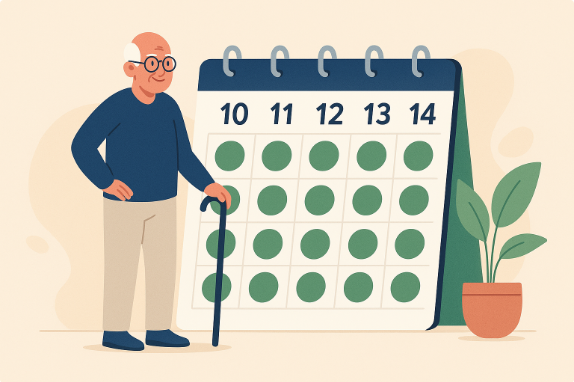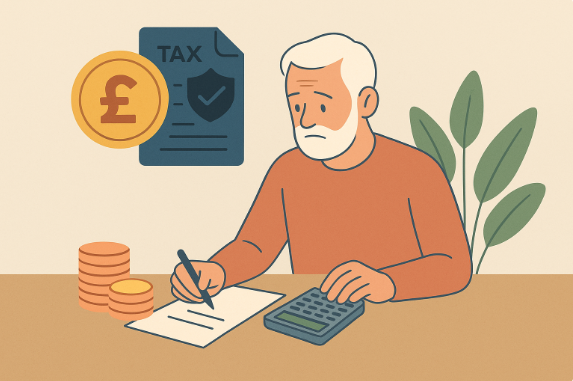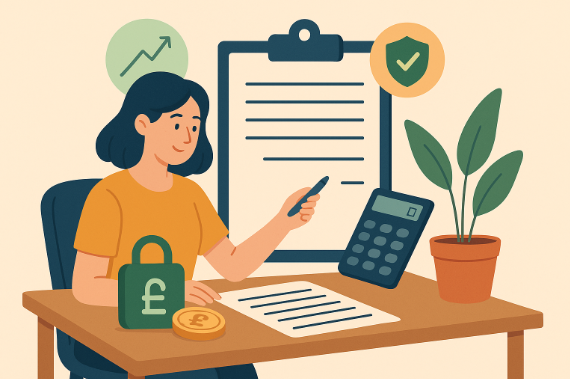If you’ve been paying into the UK’s National Insurance system for decades, you might be wondering: “Can I stop paying National Insurance after 35 years?” It’s a fair question because the government often says you need 35 years of contributions to qualify for the full new State Pension. However, the reality is a little more complicated. Let’s break it down clearly so you know exactly what to expect.
What is National Insurance and why do UK residents pay it?
National Insurance (NI) is not just another tax. It’s a system designed to fund important state benefits in the UK, including the State Pension. If you’re working or self-employed, chances are you’ve seen “NI” deductions on your payslip.
Why do people in the UK pay National Insurance?
You pay National Insurance contributions (NICs) to:
-
Qualify for the State Pension
-
Access certain benefits, like Maternity Allowance or Jobseeker’s Allowance
-
Build an NI record that shows your eligibility for government support
There are different classes of NI, depending on your situation:
-
Class 1 – Paid automatically by employees and employers
-
Class 2 – Paid by most self-employed people
-
Class 3 – Voluntary contributions to fill in gaps
-
Class 4 – Paid by self-employed based on profits
In short: National Insurance is the backbone of the UK pension system.
How many years of National Insurance contributions are needed for a full State Pension?

The UK’s State Pension system changed in April 2016. Under the new State Pension rules:
-
You need 35 qualifying years of NI contributions for a full pension.
-
You need a minimum of 10 years to get any State Pension.
-
If you have between 10 and 34 years, you’ll get a partial pension.
What are the different pension outcomes?
Here’s a simple breakdown:
| Years of NI contributions | What you get | Weekly State Pension (2023/24) |
|---|---|---|
| Less than 10 years | No pension | £0 |
| 10–34 years | Partial | Pro-rata (based on years) |
| 35+ years | Full pension | £221.20 per week (£11,502/year) |
So yes, 35 years is the magic number for a full pension—but it doesn’t mean you can stop paying once you hit that number.
Can you really stop paying National Insurance after 35 years?
Here’s where things often get misunderstood. Just because you have 35 years of contributions doesn’t mean HM Revenue and Customs (HMRC) will stop collecting NI from your wages.
Why doesn’t NI stop after 35 years?
-
NI is linked to your income and employment status, not just your pension record
-
If you’re employed and earn above the NI threshold (£12,570 in 2023/24), NI continues automatically
-
The system doesn’t check your NI history each time you’re paid—it simply charges based on income
In short: you keep paying NI until you reach State Pension age, not until you hit 35 years.
What happens if you keep paying National Insurance after 35 years?

If you’ve already secured 35 years, any extra contributions won’t increase your State Pension further. That’s the rule.
Do extra NI years give you extra pension?
No—they don’t boost your pension beyond the maximum. But NI still has a role:
-
Other benefits: Your contributions might still count towards things like Employment and Support Allowance or Bereavement Support Payment.
-
Ongoing deductions: If you’re working, NI keeps coming out of your payslip until pension age.
-
Voluntary contributions: If you haven’t yet reached 35 years, topping up could help—but after 35, it’s unnecessary.
As pensions expert Steve Webb once said:
“People often think NI is like a savings account for their pension—but it’s really a tax that funds the system as a whole.”
At what age do you stop paying National Insurance in the UK?
The key factor isn’t how many years you’ve paid, but your age.
What are the rules?
-
Once you reach State Pension age, you stop paying NI.
-
For employees, your employer will automatically stop NI deductions from your payslip.
-
For self-employed people, HMRC will not charge Class 2 or Class 4 contributions once you reach pension age.
👉 Example: If your State Pension age is 66 and you’re still working, you’ll continue to pay NI on earnings up until your 66th birthday. From that point, NI stops automatically.
Should you pay voluntary National Insurance contributions if you have gaps?
Sometimes, people don’t have a full 35 years by the time they approach retirement. This can happen due to career breaks, living abroad, or periods of low income.
When do voluntary contributions make sense?
You might consider paying voluntary NI if:
-
You have less than 35 years and want to boost your pension
-
You took time out of work (e.g., raising children) and missed contributions
-
You’re close to retirement and want to secure the full pension amount
Cost vs. benefit
-
Buying a missing year costs around £824 (Class 3, 2023/24)
-
It can increase your pension by up to £302 per year for life
-
Most people recoup the cost within 3 years of retirement
How does your employment status affect National Insurance contributions?
Whether or not you pay National Insurance (NI) depends on how you earn your income. Here’s a quick comparison:
| Employment status | How NI is paid | Key details | Impact on State Pension |
|---|---|---|---|
| Employees (PAYE) | Deducted automatically from wages above the primary threshold (£12,570 in 2023/24) | Employer also pays an extra contribution on top of your deduction | Builds qualifying years if you earn enough |
| Self-employed | Pay Class 2 (flat weekly rate) and Class 4 (percentage of profits) | Contributions are made via your Self Assessment tax return | Counts towards your 35 qualifying years |
| Unemployed or low income | Usually don’t pay NI directly | May receive NI credits if you’re claiming benefits (e.g., Universal Credit, Child Benefit for a child under 12) | NI credits protect your record and keep pension years building |
What strategies can help you optimise National Insurance contributions?

Nobody wants to pay more than they need to. Here’s how you can make sure you’re paying smartly, not unnecessarily.
Practical steps to take
-
Check your NI record – Log in to your HMRC account and see how many qualifying years you have
-
Identify gaps – Work out whether voluntary contributions make financial sense
-
Plan around pension age – Remember NI stops at State Pension age, not at 35 years
-
Get advice – A financial adviser can help tailor pension and tax planning to your circumstances
What happens if you keep working after State Pension age?
Reaching State Pension age doesn’t mean you must stop working. Many people carry on earning.
-
You no longer pay NI contributions, even if you keep earning above the NI threshold.
-
You’ll still pay Income Tax if your earnings are above the personal allowance.
-
Your State Pension will be paid on top of your wages.
Do you get a refund if you’ve paid more than 35 years of NI?
This is a common question, but the answer is simple: no, there are no refunds.
-
NI is not a personal savings account—it’s a tax that funds the welfare system.
-
Extra years don’t boost your pension beyond the maximum weekly rate.
-
HMRC doesn’t refund “overpayments” once you’ve hit 35 years.
What are National Insurance credits and why do they matter?
Not everyone works 35 years straight. NI credits help fill the gaps so you don’t lose out.
You may get NI credits if you are:
-
Receiving Child Benefit for a child under 12
-
A registered carer for someone else
-
On certain sickness or unemployment benefits
👉 NI credits mean your record keeps building, even if you’re not paying NI.
How do National Insurance contributions affect other benefits?
National Insurance isn’t just about pensions. Contributions also unlock access to other benefits:
-
Statutory Sick Pay – for employees who fall ill
-
Maternity Allowance – for self-employed or those not eligible for statutory maternity pay
-
Bereavement Support Payment – for widows/widowers in certain cases
-
Jobseeker’s Allowance (contribution-based) – if you lose work
This is why NI still matters even if you already have 35 years under your belt.
Conclusion
The short answer is no. Even if you have 35 qualifying years, you must keep paying National Insurance until you reach State Pension age—unless your income falls below the threshold.
The good news is that once you reach pension age, NI deductions stop, even if you continue working. The important thing is to check your NI record early so you know whether voluntary contributions are worthwhile or if you’re already secure.
FAQs on National Insurance and 35 years rule
Do I get a refund if I pay more than 35 years of National Insurance?
No, you don’t get a refund. Extra years beyond 35 don’t increase your State Pension.
Can I claim the full State Pension if I have less than 35 years of NI contributions?
You can still get a partial pension if you have at least 10 years. Anything below that means no pension entitlement.
What happens if I work past State Pension age in the UK?
You’ll still pay Income Tax, but you won’t pay National Insurance once you’re past pension age.
Can I avoid paying National Insurance before I retire?
Only if your earnings are below the NI threshold or you’re already past State Pension age. Otherwise, NI is mandatory.
How do I check if I already have 35 years of contributions?
You can check online through your HMRC personal tax account. It shows your NI history, qualifying years, and any gaps.
I’m Laura Wilson, a passionate blogger and content creator with a deep interest in business, finance, and entrepreneurship. I’ve had the opportunity to write for several premium blogs, sharing insights & practical advice for individuals & small businesses. I’m the founder and publisher of ukbusinessmag.co.uk, where I focus on creating valuable, easy-to-understand content to help UK startups & SMEs grow.



